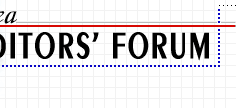
 |
|
||||||||
 |
Entering the Field of Technical Editing: Anticipate the Future
Panelists: Patricia Egan, Robyn Brode Orsini, and Lyn Smirnov
Wednesday, Sept. 24, 2008
Patricia Egan arranged this forum and these notes were written by Micah Standley
One of the main functions of an editor is to serve as “another pair of eyes” evaluating and refining an author’s work to make it as clear as possible. In technical communication, an editor’s role is often critical to the success of a project. One classic example is Edward Tufte’s analysis of the O-Ring charts that NASA engineers used before the space shuttle Challenger’s fateful launch, as shown in his book Visual Explanations. The data in the charts was so poorly presented graphically that it’s easy to see how the engineers glossed over it. If the data had been shown in a more easily comprehensible way, the Challenger disaster might have been averted.
Our September meeting focused on technical editing and the educational opportunities available to those wishing to enter that field. Three distinguished technical editors led the discussion: Patricia Egan, who teaches in the Technical Communication program at UC Berkeley Extension; Robyn Brode Orsini, who teaches the Professional Editing course at the SF State Technical and Professional Writing program; and Lyn Smirnov, technical writing instructor at De Anza College in Cupertino.
So, what differentiates technical editing from general editing? It is the subject matter. When asked to name some industries where technical editing is used, the panelists listed these examples: software and computers, medical, manufacturing, finance, engineering, science, bio-tech, legal, government, and gaming. According to Orsini, the need for technical editors in the field off “green” technology and sustainable energy sources is definitely on the rise: “We’re at a major tipping point in that industry, and the need for technical editors will be huge.”
Interest in the subject matter is integral to the work of technical editing. “You might have a degree in it; you might have a professional background in it; or you may have interest and want to learn,“ said Orsini.
What if you have an interest in a particular field, but no experience? Get creative. One audience member expressed an interest in the bio-tech field but said that all of her experience was in software development. Smirnov suggested applying the audience member’s background to the bio-tech field by seeking out those companies that develop medical software. “Reach out to them and see if you can come in through the high-tech side; then you can absorb all the buzz words and slide in. You may be narrowing your choices initially, but would be leveraging your strengths to get your foot in the door.”
Even if an editor is not a subject matter expert in a particular field, he or she can certainly bring significant value to a project. Egan told of a project early in her career when she was asked to edit a peer-reviewed article written by a team of researchers from two different companies with four different native languages represented. The article was to be published in the Netherlands. “I was very clear and told them, ‘I can’t validate your content; I don’t have that background. What I can do is make sure that your work conforms to a style guide and ensure that there are no inconsistencies in the article.’”
The Bay Area has long been a technology hub, and there are many employment opportunities for technical editors if you have an interest in the specific industry and the skill set necessary. According to Egan, one necessary skill is the ability to successfully complete an editing test. When she first moved here, Egan was sent by a recruiter to a potential employer who administered an editing test that lasted an entire day. A grueling experience to be sure, but Egan passed and got the assignment. One of the first handouts she gives her students is an article by Geoffrey J.S. Hart in the April 2003 issue of Intercom, the magazine of the Society for Technical Communication. Titled “Editing Tests for Writers,” the article explains what to expect from such a test and some strategies for successfully completing it.
As educators in technical editing, the panelists reviewed specific aspects of their respective programs and the educational opportunities available to those who may want to enter the field. Each program takes a comprehensive approach by teaching the general skills necessary--grammar and syntax review, editorial querying, creating style sheets, creating and developing the author-editor relationship--and then applying those skills to real-world situations in technical communication.
In Smirnov’s experience, “A technical editor needs to be a jack- of-all-trades. You need to be able to go in and do the ‘deep dives’ as well as the copyedits.” Smirnov said that most of her students are working professionals who want to branch out into new aspects of their field and develop new skill sets to give themselves a competitive advantage. Orsini summed it up this way: “There are many approaches to entering the field of technical editing. When I started editing corporate annual reports, I didn’t know what I was doing. But I was fascinated by what was being presented, so I sat down, analyzed the information, and took it one step at a time.”
Micah Standley is the associate editor of artistic publications for San Francisco Opera. He has written and edited for projects ranging from music and opera to veterinary medicine and quilting. He is also a freelance musician.
home |
find the right editor |
membership |
about us
what do editors do? |
next forum |
forum index
editing resources |
contact us |
search
© 1997–2024 Bay Area Editors' Forum. All rights reserved.
~~ Responsive CSS (beta) ~~